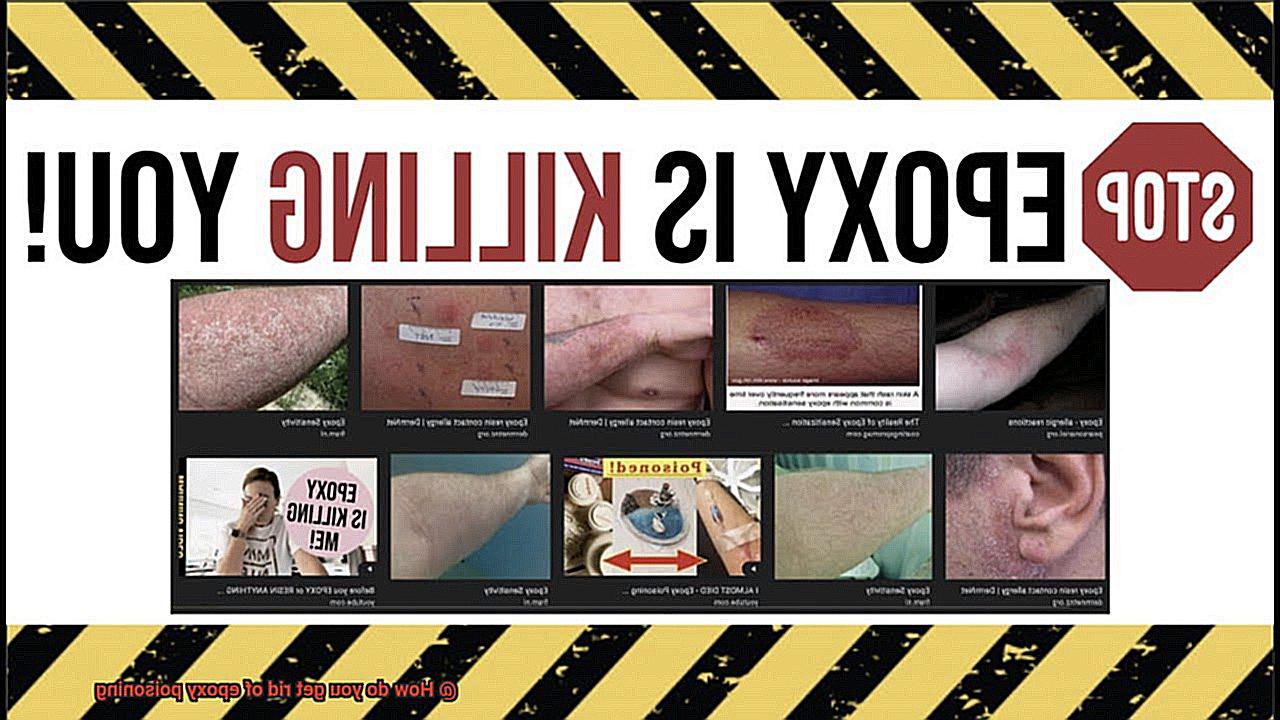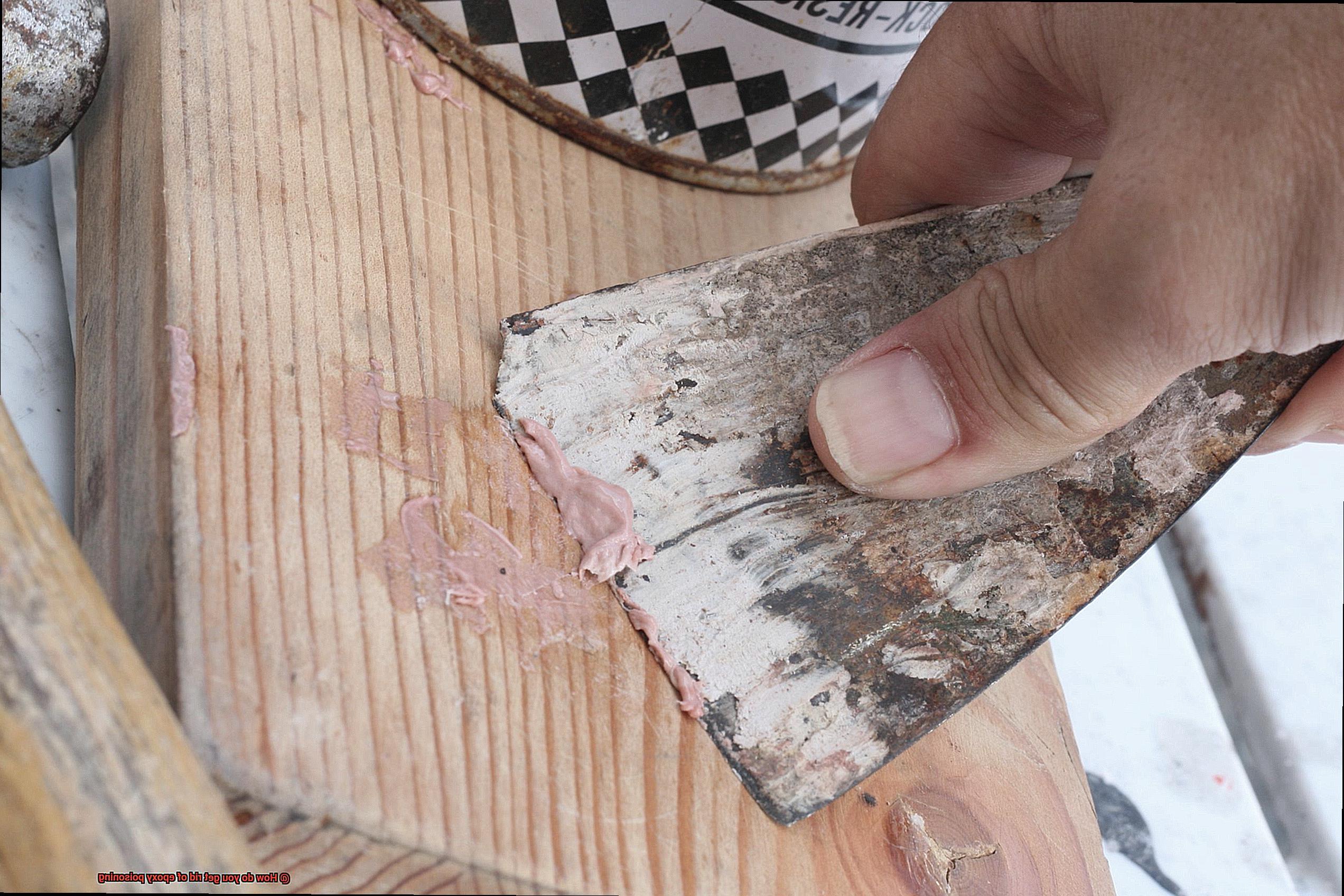Epoxy is one of those materials that has become ubiquitous in our lives. From fixing household appliances to constructing buildings, epoxy is everywhere. But with great power comes great responsibility, and the risks associated with epoxy poisoning are no joke. Symptoms can range from mild irritation to severe complications like allergic reactions, skin rashes, and even breathing difficulties. If you’ve experienced it, you know how important it is to get rid of it ASAP.
In this blog post, we’ll explore the various ways to treat epoxy poisoning and prevent it from happening again. We’ll start by examining what epoxy is and its many uses before diving into the common causes of poisoning. Then we’ll take a closer look at the symptoms and severity of the condition so you understand why taking swift action is so important.
But don’t worry – we won’t leave you hanging. We’ll also give you practical tips on how to treat epoxy poisoning yourself as well as when to seek professional medical help. Whether you’re a DIY enthusiast or just curious about this topic, this post is for you. We’ve gathered information from various sources to provide a comprehensive guide on how to deal with epoxy poisoning so that you can continue using this versatile material without any risks.
So let’s dive in together and learn how to keep ourselves safe while still enjoying all the benefits that epoxy has to offer.
Causes of Epoxy Poisoning
Contents
Epoxy resins are a widely used substance in both industrial and household applications. Unfortunately, exposure to uncured epoxy resin can lead to serious health risks and even cause poisoning. Understanding the causes of epoxy poisoning and how to prevent it is essential for those who work with this substance.
Inhalation of fumes produced during the mixing and application of epoxy resin is one of the primary causes of poisoning. These fumes contain harmful chemicals such as Bisphenol A (BPA) and Epichlorohydrin (ECH), which can cause respiratory problems, headaches, dizziness, and nausea. Long-term exposure can lead to more severe health issues such as lung cancer and liver damage.
Skin contact with uncured epoxy resin can also lead to poisoning as the chemicals in the resin can penetrate the skin and cause irritation or even chemical burns. Prolonged skin contact can lead to more severe symptoms, such as dermatitis and eczema.
Ingesting the resin is another cause of poisoning that can occur when individuals do not follow proper safety protocols. Ingestion of epoxy resin can cause vomiting, diarrhea, and abdominal pain. Severe cases can lead to liver and kidney damage.
To avoid epoxy poisoning, it is critical always to wear protective gear such as gloves, goggles, and a respirator when handling or working with epoxy resin. Proper ventilation in work areas is also crucial since fumes from the resin can be dangerous if inhaled in large amounts.
Furthermore, following proper handling and disposal procedures for the resin is also essential. This includes properly labeling containers, storing them in a safe place away from children or animals, and avoiding eating or drinking near the work area.
If you come into contact with epoxy resin, immediately wash off exposed skin with soap and water. In cases of eye exposure, rinse thoroughly with water for at least 15 minutes. If you experience any symptoms of epoxy poisoning after exposure, seek immediate medical attention.
Symptoms of Epoxy Poisoning
Firstly, let’s discuss skin irritation. This can manifest as redness, itching, or even a rash on the affected area of skin. Even brief exposure to epoxy resin can cause this common symptom.
Inhaling epoxy fumes can irritate your lungs and cause respiratory distress. Symptoms may include difficulty breathing, coughing, and chest pain. Seek medical attention immediately if you experience any of these symptoms.
Gastrointestinal symptoms such as nausea, vomiting, and diarrhea can also occur with exposure to epoxy resin. The severity of these symptoms depends on the level of exposure.
Headaches and dizziness are other common symptoms of epoxy poisoning. The chemicals present in epoxy resin may cause lightheadedness or dizziness after working with it.
Untreated exposure to epoxy resin can lead to more severe symptoms such as seizures, loss of consciousness, and even death. Therefore, it is critical to seek medical attention if you experience any of these symptoms.
Diagnosing Epoxy Poisoning
Epoxy resin is a versatile and popular material used in various industries, including construction, art, and jewelry making. However, exposure to this material can cause serious health problems, and diagnosing epoxy poisoning can be challenging.
Symptoms of epoxy poisoning may not appear until hours or even days after exposure. The most common symptoms include skin irritation, respiratory problems, and eye irritation. Skin irritation manifests as redness or swelling around the area exposed to the resin. Respiratory problems include difficulty breathing and coughing, while eye irritation results in redness and itchiness.
If you suspect that you or someone you know has been exposed to epoxy resin, it is important to seek medical attention right away. A doctor will perform a physical examination and take a detailed medical history to determine the cause of the symptoms. They may also conduct tests such as blood tests and X-rays to rule out other possible causes.
It is essential to note that some people may be more susceptible to epoxy poisoning than others. Individuals with pre-existing respiratory problems, allergies, or skin sensitivities may experience more severe symptoms. Additionally, prolonged exposure to epoxy fumes can increase the risk of developing symptoms.
To minimize the risk of exposure to epoxy resin, proper safety precautions must be taken. Protective clothing and gloves should always be worn when working with epoxy resin to minimize skin contact with the resin. Working in a well-ventilated area ensures that fumes are not trapped in an enclosed space.
Treatments for Epoxy Poisoning
Epoxy resin is a versatile and indispensable material utilized in numerous applications; however, it can pose severe health risks if not handled with caution. If you or someone you know has been exposed to epoxy and is experiencing symptoms of poisoning, prompt medical attention is crucial.
The severity of the symptoms will dictate the treatment for epoxy poisoning. For mild symptoms such as skin irritation or respiratory issues, the first step is to remove the person from the source of exposure and provide fresh air. However, if symptoms persist or worsen, immediate medical intervention is necessary.
Healthcare professionals may recommend treatments like oxygen therapy, bronchodilators, or corticosteroids to alleviate respiratory symptoms. For skin contact with epoxy, washing affected areas with soap and water is important, and over-the-counter creams or ointments can soothe irritated skin.
Ingestion of epoxy can be extremely dangerous and should be treated as a medical emergency. It’s essential to seek immediate medical attention and follow any instructions given by healthcare professionals. Inducing vomiting should be avoided as it can lead to further damage to the esophagus and throat.
Prevention is always better than cure when it comes to epoxy poisoning. Wearing proper protective equipment like gloves, masks, and goggles when handling epoxy is crucial. Additionally, working in well-ventilated areas can significantly reduce the risk of exposure and subsequent poisoning.
How to Prevent Epoxy Poisoning
Epoxy resin products can be a great addition to any DIY project, but it’s crucial to keep yourself safe by preventing epoxy poisoning. Here are some steps you can take to ensure your safety:
Protective gear
Protect yourself by wearing gloves, goggles, and a respirator mask to prevent any harmful fumes or chemicals from entering your skin, eyes, or lungs.
Well-ventilated area
Work in an area with proper air circulation. Use exhaust fans or open windows to help remove any fumes that may be released during the curing process.
Proper mixing

Follow the manufacturer’s recommended mixing ratio and mix only what you need. Over-mixing can cause the resin to heat up and release toxic fumes.
Avoid skin contact
Epoxy resin can easily stick to your skin, so try to avoid getting it on your skin as much as possible. If you do get it on your skin, immediately wash the affected area with soap and water.
No food or drinks
Avoid eating or drinking while working with epoxy resin and keep all food and drinks away from your workspace. This will prevent any accidental ingestion of harmful chemicals.
Safe storage
Store epoxy resin products in a cool and dry area that is out of reach of children and pets. Always make sure that lids are tightly sealed when not in use to prevent any accidental spills or exposure.
Safety Measures When Working with Epoxy Resin
Working with epoxy resin can be a thrilling experience, but it’s important to prioritize safety to avoid any potential harm. Epoxy resin is a hazardous substance that can cause skin irritation and respiratory issues if not handled with care. Therefore, it is essential to take the necessary measures before diving into your project.
Firstly, protective gear such as gloves, a mask, and safety glasses should be worn at all times when working with epoxy resin. These items will shield your skin and eyes from any potential harm. It is also crucial to work in a well-ventilated area to avoid inhaling the fumes. Use a fan or open windows to circulate the air and prevent the accumulation of toxic gases.
Avoid working in a confined space where the fumes from the epoxy resin can build up. Keep your workspace clear of any food and drinks and store epoxy resin products in a cool, dry area that is out of reach of children and pets. Following these steps will help you stay safe while working with epoxy resin.
It is also important to follow the manufacturer’s recommended mixing ratio for the epoxy resin. Mixing too much or too little can lead to adverse effects, so make sure to read the label and follow the instructions carefully.
If you accidentally come into contact with epoxy resin, wash it off immediately with soap and water. If you experience any symptoms such as dizziness or difficulty breathing, seek medical attention right away.
First Aid for Skin and Eye Exposure
While it’s easy to get caught up in the excitement of a new project, neglecting safety measures can lead to painful or even dangerous situations.
If you do come into contact with epoxy, immediate action is crucial. Let’s dive into the steps you should take for skin and eye exposure.
Skin Exposure:
When dealing with skin exposure to epoxy, time is of the essence. It’s crucial to remove any contaminated clothing and wash the affected area thoroughly with soap and water. If the epoxy has hardened on the skin, do not try to remove it forcefully as this may cause further damage. Instead, soak the affected area in warm soapy water until the epoxy softens and can be gently peeled off.
If there is any irritation or redness, apply a cold compress to the affected area and seek medical attention if necessary. Remember that even if there is no visible damage, exposure to epoxy can still cause harm.
Eye Exposure:
If you experience eye exposure to epoxy, flushing your eye with lukewarm water for at least 15 minutes is crucial. Make sure to hold your eye open while flushing to ensure that all of the epoxy is washed out. Seek medical attention immediately after flushing, even if there is no initial irritation or discomfort. This is because exposure to epoxy can later cause serious damage that may not be initially apparent.
Prevention:
While it’s important to act quickly when exposed to epoxy, prevention is always the best course of action. Always wear protective clothing, gloves, goggles, and a respirator when working with epoxy to minimize the risk of skin and eye exposure.
When to Seek Medical Attention
Epoxy resin is a versatile adhesive that is commonly used in construction, woodworking, and other industries. However, it contains harmful chemicals that can cause poisoning if ingested, inhaled, or come into contact with skin or eyes. In this blog post, we’ll explore when to seek medical attention for epoxy poisoning and what steps to take to ensure the best possible outcome.
Firstly, if you or someone else has been exposed to epoxy resin and is experiencing symptoms of poisoning, it’s vital to seek medical attention immediately. The effects of epoxy poisoning can be severe and even life-threatening in some cases. Don’t hesitate to seek help as the sooner you receive treatment, the better the chances of a full recovery.
When seeking medical attention for epoxy poisoning, provide as much information as possible about the exposure. This may include the type of epoxy resin used, the amount used, how long the person was exposed to the resin, and any symptoms experienced. The more information provided, the better equipped medical professionals will be to determine the most appropriate course of treatment.
Medical professionals may recommend a variety of treatments depending on the severity of the symptoms. These could include administering oxygen to help with breathing difficulties, providing medications to alleviate symptoms such as nausea or coughing, or performing advanced treatments such as intubation or ventilation in severe cases.
It’s important to note that even if symptoms appear mild at first, they can escalate quickly and become more severe over time. Therefore, seeking medical attention promptly after exposure to epoxy resin is critical.
RHd0DEVrq1s” >
Conclusion
In summary, epoxy resin is a versatile material that can pose serious health risks if not handled with caution. From minor skin irritation to severe respiratory issues and even death, the symptoms of epoxy poisoning are not to be taken lightly.
To prevent epoxy poisoning, it’s essential to take preventative measures such as wearing protective gear like gloves, goggles, and a respirator mask. Additionally, always work in a well-ventilated area and avoid ingesting or inhaling fumes.
In case of exposure to the skin or eyes, it’s crucial to act quickly by washing the affected area with soap and water and seeking medical attention if necessary. If you experience any symptoms of epoxy poisoning such as difficulty breathing or coughing, seek medical attention immediately.
Remember that prevention is key when it comes to avoiding epoxy poisoning. By following proper handling procedures and safety protocols for this material, you can continue using it without any risks.






